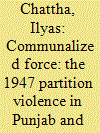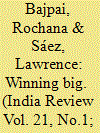|
|
|
Sort Order |
|
|
|
Items / Page
|
|
|
|
|
|
|
| Srl | Item |
| 1 |
ID:
184779


|
|
|
|
|
| Summary/Abstract |
The communalization of the police, which resulted from the embittered political situation among the rival communities, was a prominent feature of the Partition violence in 1947. Instead of safeguarding minority communities under attack, the police largely condoned and contributed to the violence, not because of sympathies with their coreligionists, but because they could act with impunity in an environment of insubordination and administrative breakdown in the process of the transition of power of the outgoing British colonial state. This article will show that the absence of a restraining authority, impunity from the law at the point of transitional state-created conditions of violence and the participation of law enforcement agencies led to the widespread violence. This documentation is done by accessing previously unexplored police First Information Reports (FIRs) lodged at local police stations at the time, and the reports of the Punjab Special Branch Intelligence Police from the Roberts Club Archives (RCA), Lahore. The analysis not only contributes to recent scholarship that focuses on the ‘new history’ of Partition studies but also provides an intriguing insight into the role of law enforcement agencies in mass violence.
|
|
|
|
|
|
|
|
|
|
|
|
|
|
|
|
| 2 |
ID:
184782


|
|
|
|
|
| Summary/Abstract |
Schools and textbooks are significant mediums for the transmission of political ideas. Textbooks therefore reflect the ideology of the day whilst imparting values, goals, and myths to younger generations. This article provides an insight into the nexus between politics, the state, the social contract, and school textbooks in India. It critically highlights the ways in which the discourses of political parties of the (national) Self and Other are invoked and reflected in school textbooks underpinning the parties’ versions of national identity and transmit their wider political messages, with devastating results on the debates about Indian citizenship. There is a clear link between changing political parties at the helm of national and state governments and which school textbooks are in use. The article reviews the textbook politics between 1998 and 2020, focusing in particular on how the present BJP-led government has appointed Hindutva-minded scholars to lead education institutions underpinning the message of India being a Hindu nation. The right wing RSS has been allowed by the Narendra Modi government to influence the formulation of the National Education Policy 2020 as well as suggesting changes to textbooks to push the national discourse of citizenship defined by Hindutva at the Union and State levels. The article adds, theoretically and substantively, to the specific link between education and the current issues of Indian citizenship as the government tries to change the values of India’s constitution. Not many in this generation of Indians think this is abnormal, as this reflects what they have learnt at school and historically been used to shape the hostile mind-set of new generations vis-à-vis their neighbors, and other religious communities. The article evaluates how over the last two decades textbooks of the National Council for Education Research and Training (NCERT) interpret government policy objectives and guidelines to depict Indian national identity, internal ethnic and cultural diversity, and citizenship.
|
|
|
|
|
|
|
|
|
|
|
|
|
|
|
|
| 3 |
ID:
184781


|
|
|
|
|
| Summary/Abstract |
This article looks into international cooperation based on shared religious solidarity; its causative factors, and how it influences relations between states. To demonstrate its effects in actual practice, this article examines the case study of the decision of the Indian government to revoke the special status of Kashmir in 2019, which prompted criticism by a few states, specifically Turkey and Malaysia, and also examines the role of the Organization of Islamic Cooperation (OIC). The article engages with the reasons for these states to engage in criticism of the Indian government’s decision and explores the influence of religious solidarity, especially Islamic solidarity in their rebukes against India, and also briefly deals with the implications such moves may have on a state’s foreign policy calculus.
|
|
|
|
|
|
|
|
|
|
|
|
|
|
|
|
| 4 |
ID:
184783


|
|
|
|
|
| Summary/Abstract |
In this paper, we analyze the beneficiaries of productivity gains in the Indian banking sector during the period from 1992 to 2019. We document the relative efficiency of different groups of banks by ownership. We find that the Indian banking sector, particularly the public sector banks, experienced steady productivity growth from the mid 1990s till about 2010. We conduct a detailed descriptive analysis to examine the various stakeholders that the productivity gains have accrued to, over the years and across bank groups. We conclude that most of the gains may have accrued to the shareholders, which for the public sector banks would mean the government. These gains presumably helped reduce the burden on the government of capitalizing the public sector banks, especially during the 1997–2002 period of sharp rise in non-performing assets.
|
|
|
|
|
|
|
|
|
|
|
|
|
|
|
|
| 5 |
ID:
184780


|
|
|
|
|
| Summary/Abstract |
Politicians winning elections with large margins of victory, beyond what is necessary to win electoral contests,what we term “winning big”, is a common, yet under-studied phenomenon across the world. Political economy models suggest that winning big is not an optimal allocation of scarce campaign resources in a SMP/FPTP electoral system. Inductive inquiry shows that incumbent politicians likely to win nevertheless campaign hard, often devoting considerable effort and resources, for reasons that remain unexamined. Focusing on India, this article explores a range of reasons that can help explain this phenomenon through an innovative research design that combines quantitative analysis with in-depth elite interviews with incumbent MPs from 10 states. We distinguish the phenomenon of “winning big” from that of “safe” seats,identify and probe factors that can contribute to large margins, including candidate strategy, party popularity, mobilizers, electoral uncertainty, and party control . Our findings suggest that while political parties in India, as elsewhere, do not spend more money on electoral contests that they likely to win comfortably, winning big can be the result, among other factors, of a party strategy to establish a reputation for invincibility, and/or individual efforts, stemming from a sense of political vulnerability felt by politicians, underestimated in the literature on safe seats.
|
|
|
|
|
|
|
|
|
|
|
|
|
|
|
|
|
|
|
|
|